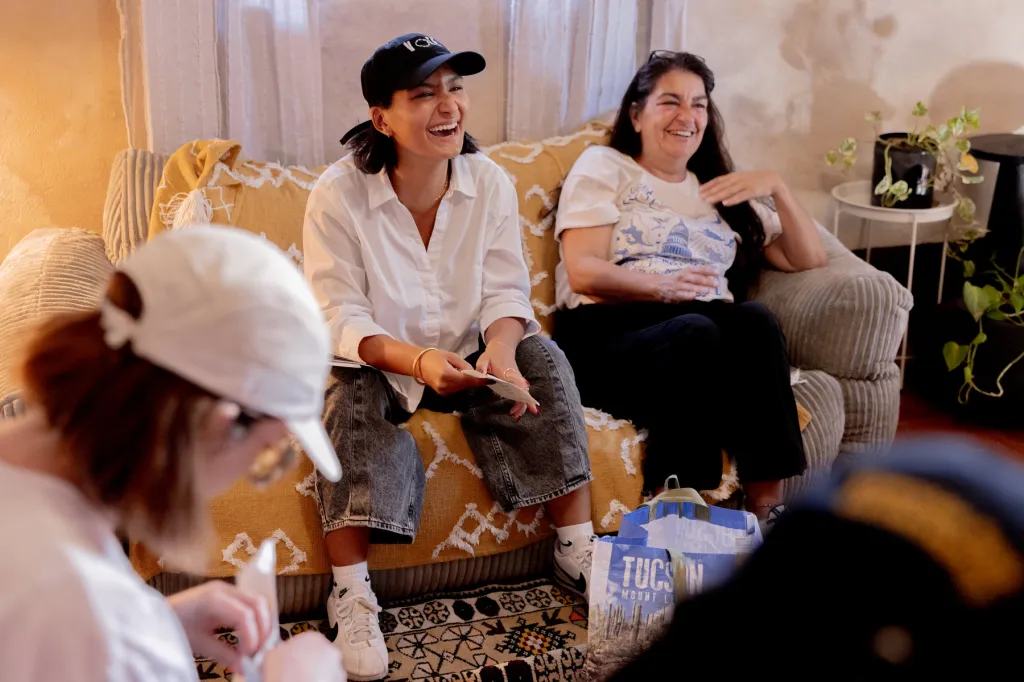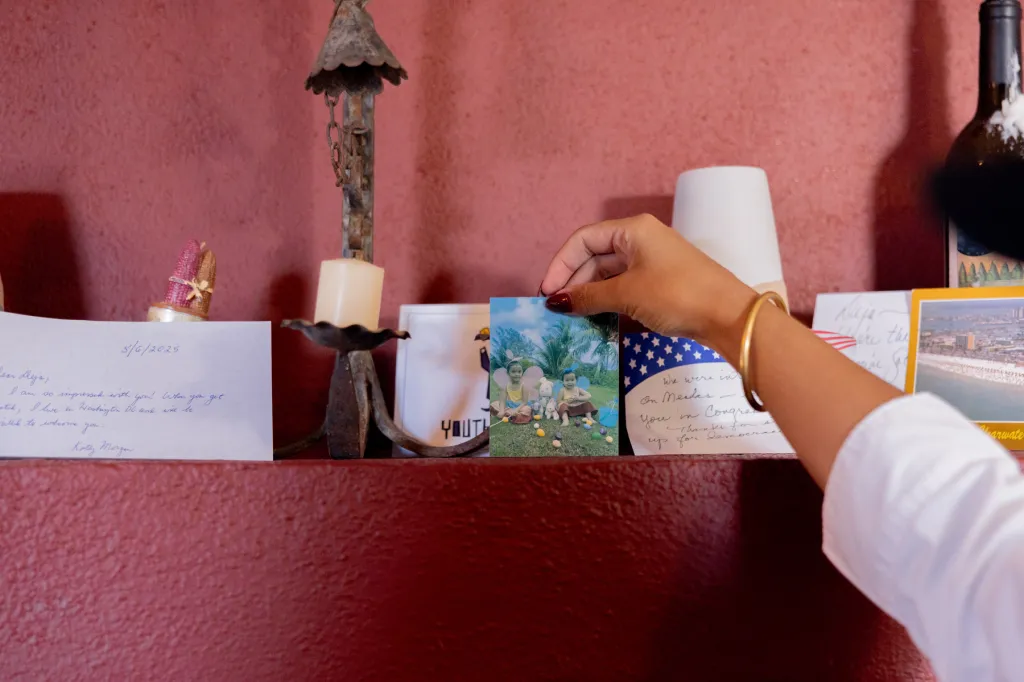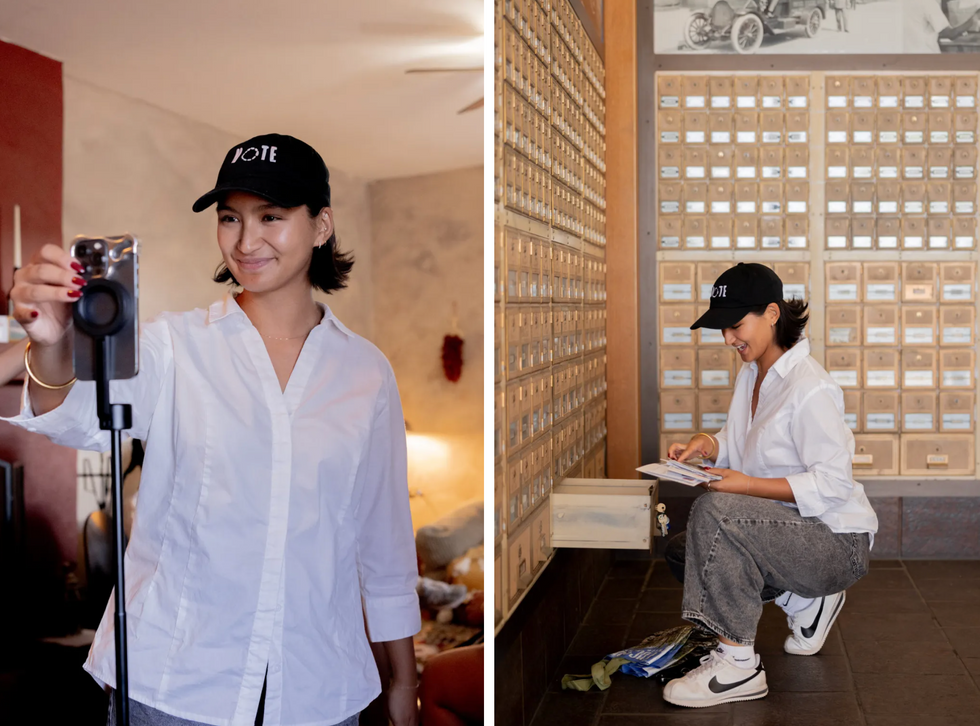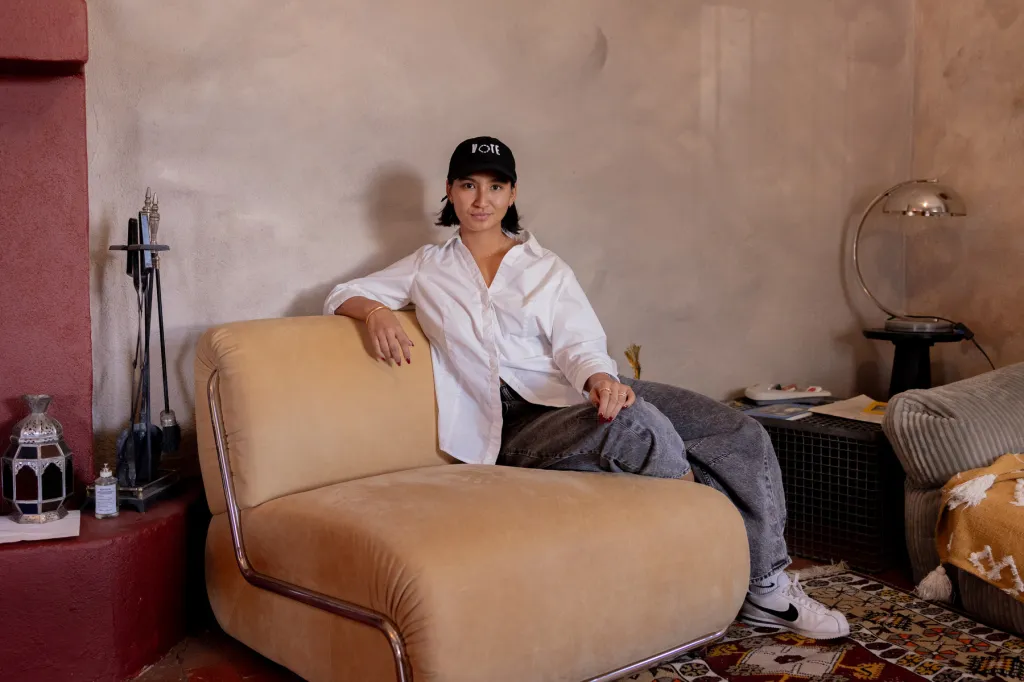TUCSON, ARIZ. — On a Saturday afternoon, Deja Foxx is staging a TikTok Live in her living room. A phone tripod is set up in front of her kitchen table. The frame is centered on a slouchy sofa against an adobe wall, where a chile ristra hangs on one side.
“All right, everybody, take your seats,” she tells the mix of young volunteers, family members and campaign staff who are gathered to help her. “You have some really great mail to open, and I’m so excited because usually it’s just me and my mom that do this.”
She goes live and takes a seat next to her mom on the couch.
One volunteer reads a letter from a 19-year-old named Henry from California: “Even though I can’t vote for you, I adore your campaign,” he wrote. “We need more young leaders and new, fresh ideas from us, Gen Z. As someone who grew up on MediCal, and free public school lunch, who currently is uninsured, I enjoy your background and fighting for us.”
Another volunteer read a note from 20-year-old Julie, who wrote that while she’s been frustrated and overwhelmed by the state of politics, following Foxx’s campaign gave her hope. “I’ve been writing to my officials, but wanted to write something positive for a change. Keep doing what you’re doing.”
Other letter writers included a 22-year-old activist who started organizing after the Parkland shooting, a college student in Phoenix who offered to work for Foxx’s political office in the future, a 23-year-old from Chicago who started following her social media years ago, a North Carolina dad of a daughter moving to Arizona, and a Kentucky woman worried about Medicaid coverage. Volunteers spent 30 minutes reading that day’s mail. During the weekly segment, the audience is usually in the thousands.
 Deja Foxx opens mail from her campaign post office box during a TikTok LIVE with her mother, Lisa Foxx, and close friends at her home in Tucson, Arizona. (Courtney Pedroza for The 19th
Deja Foxx opens mail from her campaign post office box during a TikTok LIVE with her mother, Lisa Foxx, and close friends at her home in Tucson, Arizona. (Courtney Pedroza for The 19thMost of the notes included a donation, with the amounts ranging from $20 to $2,000. By the end of the read out Foxx had raised $4,000, mostly from people located outside Arizona. Just two days before, she announced she hit $500,000 in campaign donations, raised through 18,000 individual donors.
Just two months ago, Foxx wrote on Substack about the difficulties of running her campaign for Congress as a Gen Z candidate. She made a plea directly to her online followers: “Our biggest challenge and the only one that really matters: You haven’t invested in us yet.”
At the time, a slow trickle of donations was keeping afloat her campaign to fill the seat left by U.S. Rep Raúl Grijalva, who represented the southern Arizona district for over 20 years.
Shortly after the lawmaker’s death in March, his daughter Adelita Grijalva — who has served for decades in local politics on Tucson’s school board and more recently on the Pima County Board of Supervisors — tossed her hat in the ring for the Democratic primary. Then came the endorsements: Arizona U.S. Sens. Mark Kelly and Ruben Gallego, and progressive politicians like Bernie Sanders and Alexandria Ocasio-Cortez. The winner of that primary, which takes place July 15 and includes former state Rep. Daniel Hernandez, will almost certainly go on to win the September special election in this solidly Democratic district.
Foxx announced that she would take on Grijalva in early April. Most of her short political life — at 25, she would be the youngest woman elected to Congress — has focused on reproductive rights. She served on the board of Planned Parenthood in Arizona at age 17, worked in Tucson health clinics as a sex educator in high school, and more recently worked on the Prop 139 Ballot Initiative campaign in 2024, which enshrined the right to abortion in the state’s constitution.
If we want to win in 2028, I promise you that it is going to require electing leaders in this party who can be effective messengers."
- Deja Foxx
 Deja Foxx reaches for mail she received from her campaign post office box on Saturday, June 21, 2025, at her home in Tucson, Arizona. (Courtney Pedroza for The 19th)
Deja Foxx reaches for mail she received from her campaign post office box on Saturday, June 21, 2025, at her home in Tucson, Arizona. (Courtney Pedroza for The 19th)
But while Foxx doesn’t have the backing of “the establishment,” as she refers to it, or the name recognition of Grijalva, she’s created her own buzz by using her social media platforms to speak directly to her generation. Over the past month, her stories have been viewed almost 30 million times on TikTok, Facebook and Instagram. She also has thousands of followers on Substack. That support and the donations that followed afforded her television advertisements, something that was out of reach when she started.
Her social media savvy has allowed her to bypass the need for big donors, build her own following, and capitalize on national support that’s percolated from the ground up. Along the way she’s making the argument that her social media skills aren’t just part of a campaign strategy, but necessary to communicate the politics of the party as the electorate grows younger and more disillusioned.
“We saw people in the party, in the traditional media, wringing their hands, ‘How did we lose young people in this last election? Why did they move toward apathy and the other side? … And it’s because we’re failing to compete in social media and new media spaces,” Foxx said. “If we want to win in 2028, I promise you that it is going to require electing leaders in this party who can be effective messengers.”
Foxx learned the power of a viral moment when she was a 16-year-old activist for Planned Parenthood. At a town hall in 2017, she asked former Arizona Sen. Jeff Flake (R) why he would deny her the American dream by voting against funding that made birth control accessible to people who grew up in poverty. Foxx, who was insured through Medicaid at the time, got her birth control from Planned Parenthood.
A clip of the exchange went viral. “I woke up the next day and millions had seen the video,” she said. It’s a moment that changed how she thought about activism. The fact that millions of people watched her on their phones and computers put her on equal footing in public discourse with the United States senator, she said. “As a 16-year-old girl working at a gas station … that is remarkable.”
In the nine years since, the political world has grown to recognize the necessity of social media in campaigns, and politicians have turned to Foxx for her expertise. At the same time she was becoming a prominent reproductive rights activist, she used Instagram to build community among her peers through her organization Gen Z Girl Gang. She worked as an influencer and digital strategist for the Kamala Harris campaign in 2019 and later as a social media director at a political action committee. In 2024, she was invited to speak at the Democratic National Convention in support of Harris as an activist and content creator.
But it’s in her own run for Congress where she has been able to test these communication strategies herself. On her TikTok and Instagram accounts, soundbites from her debates have racked up millions of views. More personal reels, like when she surprised her mom with her first batch of campaign literature, have gone viral. She’s embraced being interviewed by independent journalists with followings on places like Substack and YouTube.
She’s using communication styles and platforms that are meeting people where they’re at.” - Jessica Maddox

Deja Foxx ends her TikTok LIVE at her home in Tucson, Arizona. Deja Foxx reaches for mail she received from her campaign post office box at the U.S. Post Office in Tucson, Arizona, on Saturday, June 21, 2025. (Courtney Pedroza for The 19th) (Courtney Pedroza for The 19th)
“She’s using communication styles and platforms that are meeting people where they’re at. That style may turn off some older voters, but it’s going to excite younger voters who are particularly disaffected or disenfranchised or disheartened by American politics and even the Democratic party,” said Jessica Maddox, an associate professor of digital media at the University of Alabama. “I’ve been particularly impressed with her TikTok presence, because it feels very authentic.”
That authenticity is the main ingredient in connecting with young voters online, experts say. Maddox and others pointed to the success of Zohran Mamdani’s mayoral campaign in New York as an example of how young politicians are tapping into social media to drum up real support at the polls. Both candidates utilized platforms to engage with people, like Gen Z, who are likely to sit out primaries where voters tend to be older.
The strategy puts lesser known candidates on a more equal playing field, allowing them to subvert the traditional hierarchies that fuel campaigns. “There’s always been a tight relationship between legacy media and politics, and social media kind of upends that,” Maddox said. “[Foxx] can kind of bypass more traditional outlets and get the message out herself.”
Social media has also turned a local race into a national fundraiser, which has helped her stay competitive. Candidates like Grijalva and Hernandez have benefited from deeper donor pockets, and outside support from political action committees. By early May, both candidates had already raised hundreds of thousands of dollars, according to the Arizona Republic. Their latest campaign finance numbers are expected to be released soon. Foxx announced she had hit $600,000 in donations at the end of June.
“It’s an interesting social media element that someone these days could have supporters kind of all over the country, even though they’re running for a very specific seat,” said Kathryn Coduto, a professor of media science at Boston University.
While there is a scarcity of polls in the race, a recent one commissioned by Foxx’s campaign shows her name recognition has risen significantly since May, when half of likely voters hadn’t heard of her. And, on Wednesday, David Hogg’s political action committee announced it would be endorsing her in the race. Hogg, who became famous for his activism after the Parkland mass shooting, now runs a political organization called Leaders We Deserve, aimed at building generational change for Democrats.
“If we replace one of the oldest members of Congress with the youngest — Deja is just 25 years old — we could send an incredibly strong message about which direction the Democratic Party is heading in, and show people how we are dramatically changing to meet this moment,” Hogg said in an Instagram Reel.
While Foxx has worked as an influencer in the past, now that she’s running for office that label has been used to undercut her years of political work and activism. At her first debate, Foxx also pointed out that some of her opponents have belittled her influencer experience. In recent news articles, people associated with Grijalva’s campaign have questioned whether Foxx’s national reach is the same as in-district community support.
The label “influencer” carries a lot of baggage, experts say. It’s still seen as superficial or trivial despite its power in activism and politics. It’s also another way of writing off young people, particularly women, as unserious.
“It’s seen as like little girls playing instead of actually utilizing this tool to accomplish something and talk to constituents,” Coduto said.
 Deja Foxx poses for a portrait on at her home in Tucson, Arizona. (Courtney Pedroza for The 19th)
Deja Foxx poses for a portrait on at her home in Tucson, Arizona. (Courtney Pedroza for The 19th)Jade Larson, who wrote her doctoral dissertation on political fandom and social media, said it’s also not surprising that there is such a stigma around being a politician-influencer.
“Every time media is used in a new way in politics, it’s this scandalous thing,” she said. “You can track it all the way back to Bill Clinton going on the ‘Late Night Show’ and playing saxophone, to Obama starting POTUS on Twitter, to Trump making his own social media [network]. It’s always something that’s scandalous, and people push back against it until it kind of becomes the mainstream and the norm.”
Arguably it is the mainstream now. The power of social media that Foxx tapped into nearly a decade ago has only grown more influential in politics and the media — two industries that are closely intertwined. A report from Pew Research Center found that over half of U.S. adults get some of their news from social media, with women and Democrats making up greater regular news consumers on apps like TikTok and Instagram. These users also skew younger, with those between the ages of 18 to 40 making up the bulk of social media news consumers. In a separate poll by Pew Research, 48 percent of TikTok users ages 18 to 29 say keeping up with politics is one of the reasons they are on the platform.
“A whole lot of congresspeople can give a very solid MSNBC interview,” Foxx said. But as someone who interviewed them as a content creator at the State of the Union, “I’m telling you that when they are put in front of an iPhone, there are so many members that fail to communicate. They don’t think the way that our generation thinks. They fail to understand sound bites and algorithms, and youth or even meme culture.”
At the same time that these social media strategies are taking off, voting power is also starting to shift to the very people that use them. Soon, Gen Z and Millennials will have just as much political sway as Gen X and the Baby Boomers — if they go out and vote, Coduto said.
“If you can cultivate enough excitement and you can find a way to really break through and get people to the polls by using social media, then I think it’s going to be an unstoppable strategy.”
They’re calling her an influencer. She’s calling it campaign strategy. was originally published by the 19th and is republished with permission.
Jessica Kutz is The 19th’s climate and gender reporter.




















